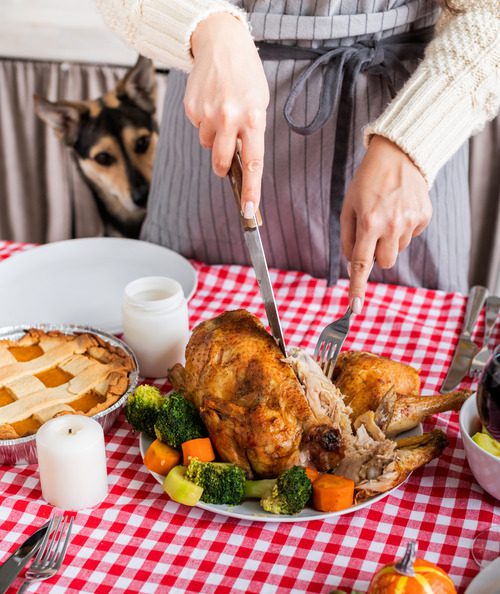Can Dogs Eat Turkey?
When it comes to sharing our meals with our four-legged companions, many pet owners often wonder about the safety and health benefits of certain foods. Turkey, a common household staple, especially during festive seasons, is one such food. At Limerick Veterinary Hospital in Limerick, PA, we understand your concern for your dog’s diet and health. This article aims to shed light on whether turkey is a suitable treat for dogs, outlining the potential benefits and risks. If you have any specific questions about your dog’s diet or health, feel free to call us at (610) 489-2848 or book an appointment online for personalized advice.

The Nutritional Value of Turkey for Dogs
Turkey is more than just a holiday centerpiece; it’s also a source of lean protein that can be beneficial for dogs. Protein is essential in a dog’s diet for muscle growth and repair, and turkey is a great source of this nutrient. It also contains various vitamins and minerals, including B vitamins and selenium, which support immune function and thyroid health. However, it’s important to note that these benefits come from plain, cooked turkey. Seasoned, processed, or raw turkey can pose health risks to dogs. If you’re considering adding turkey to your dog’s diet, keep it simple and safe.
Appropriate Portions and Preparation
When introducing turkey to your dog’s diet, moderation is key. Start with small portions to gauge your dog’s reaction. The turkey should be cooked without any added fats, spices, or sauces, as these can be harmful to dogs. Avoid giving them the skin or bones, as they can cause digestive issues or choking hazards.
Potential Health Risks of Feeding Turkey to Dogs
Feeding turkey to dogs can bring several potential health risks, but with careful consideration and proper preparation, these risks can be significantly minimized. As pet owners, it’s essential to be aware of these concerns and take proactive steps to ensure your dog enjoys this treat safely:
- Toxic Ingredients and Seasonings: Many seasonings and ingredients used in preparing turkey for human consumption are toxic to dogs. Garlic, onions, and excessive salt, which are common in turkey recipes, can lead to serious health issues in dogs, including gastrointestinal upset and, in severe cases, anemia. To minimize this risk, always ensure that the turkey you feed your dog is plain, without any added seasonings, herbs, or spices. Cooked turkey breast, with no skin or seasonings, is the safest option.
- Choking Hazards and Bones: Turkey bones, both cooked and uncooked, pose a significant choking hazard and can splinter easily, potentially causing blockages or even tears in the digestive tract. To prevent these dangers, never feed your dog turkey bones. Instead, offer only boneless cuts of meat. It’s also crucial to cut the turkey into small, manageable pieces to prevent choking, especially for smaller dogs.
- Allergies and Individual Sensitivities: Some dogs may have allergies or sensitivities to turkey. Symptoms of a food allergy can include itching, red skin, ear infections, and gastrointestinal upset. To minimize the risk of an allergic reaction, introduce turkey into your dog’s diet gradually and in small amounts. Keep a close eye on your dog for any signs of discomfort or allergic reactions, and if you suspect an allergy, discontinue feeding the turkey and consult your veterinarian.
- Portion Control: Overfeeding turkey, even if it’s prepared safely, can lead to weight gain and upset the nutritional balance in your dog’s diet. To avoid this, turkey should only be given as a small part of your dog’s diet, not as a main meal. Follow the rule of treating it as a snack, making up no more than 10% of your dog’s daily calorie intake.
- Consult Your Veterinarian: Before introducing any new food into your dog’s diet, it’s always a good idea to consult with your veterinarian. This is especially important for dogs with pre-existing health conditions, dietary restrictions, or sensitive stomachs. Your vet can provide guidance tailored to your dog’s specific health needs and dietary requirements.
- Regular Monitoring: After introducing turkey to your dog’s diet, monitor them closely for any adverse reactions. This includes watching for changes in their stool, any signs of gastrointestinal distress, or changes in behavior. If you notice anything unusual, contact your veterinarian immediately.
Safe Alternatives to Turkey for Dogs
If you’re concerned about the risks of feeding turkey to your dog, there are several safe and healthy alternatives. Other lean meats like chicken or beef, cooked without seasoning, can be good options. There are also many commercial dog treats and foods formulated to provide the nutritional benefits of meat without the risks associated with human food preparations. Discussing these options with a veterinarian can help you make the best choice for your dog’s dietary needs.
Importance of a Balanced Diet
Maintaining a balanced diet is critical for a dog’s overall health and well-being. An unbalanced diet or excessive consumption of foods like turkey can lead to various health issues. Understanding these impacts helps pet owners make informed decisions about their dog’s nutrition.
- Nutritional Balance: A balanced diet is crucial for overall health, providing the right mix of proteins, carbohydrates, fats, vitamins, and minerals. An unbalanced diet, heavy in one food like turkey, can lead to nutrient deficiencies or excesses.
- Weight Management: Excessive turkey, especially fatty parts, can contribute to weight gain and obesity, leading to health issues like diabetes, joint problems, and heart disease.
- Digestive Health: A diet lacking in variety or dominated by one food type may cause digestive problems such as constipation, diarrhea, or upset stomach.
- Immune System and Vitality: A balanced diet supports the immune system, skin and coat health, muscle strength, and overall vitality. Imbalances can weaken immunity and affect physical appearance and energy levels.
- Portion Control: Turkey should be a supplement to a dog’s diet, not a replacement. Majority of their nutrition should come from high-quality, balanced commercial dog food.
- Veterinarian Consultation: It’s important to consult a veterinarian for personalized dietary recommendations, especially when making significant changes to a dog’s diet.
- Adjusting to Needs: Regular veterinary check-ups are essential to adjust the diet as per the dog’s changing age, health status, and activity level. Monitoring weight and health can indicate dietary sufficiency.
- Overall Health Impact: A balanced diet is key to a dog’s long-term health and happiness. Moderation and variety are crucial in their diet.
When to Consult Your Vet about Your Dog’s Diet
Every dog is unique, and what works for one might not be suitable for another. This is why it’s important to consult your veterinarian before making any significant changes to your dog’s diet. If you notice any changes in your dog’s appetite, digestion, or overall health after introducing new foods, inform your veterinarian. At Limerick Veterinary Hospital, our team is dedicated to providing personalized care and advice. Whether you have concerns about food allergies, dietary needs, or just general questions, we’re here to help.
Call Limerick Veterinary Hospital for an Appointment
Understanding whether dogs can eat turkey involves balancing the potential benefits with the risks. While turkey can be a source of lean protein for dogs, it must be prepared safely and fed in moderation. Be aware of the potential hazards, such as harmful seasonings and bones, and consider your dog’s individual health and dietary needs. For any concerns or questions about your dog’s diet, or to make an appointment, Limerick Veterinary Hospital is here to assist. Reach out to us at (610) 489-2848 or book an appointment online. Remember, a well-informed pet owner is the best ally a dog can have in maintaining a healthy and happy life.
